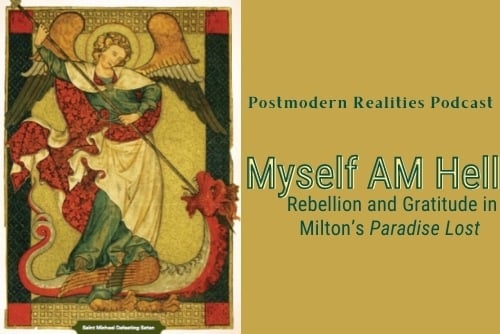In the human heart burns a yearning to be free — to live by our own discretion, to choose what we think good, and to stand responsible for the lives we have lived. This same yearning, though, goes easily awry: the legitimate human desire for agency swelling into a desire for absolute autonomy. But the desire for absolute autonomy, even from divine authority, leads to frustration with the limits of being, turning us against the moral (and even the physical) structures of the world; for structures are, by nature, limited and limiting. We may even turn against the structure of our own person. Such a turning begets acedia — a vice marked by spiritual malaise or boredom. Acedia is sadness at the divine proclamation that being is good. Paradise Lost, by John Milton (1608–1674), an epic poem foundational to the British literary canon, explores the relationship between the demand for absolute autonomy and acedia, a vice which cripples the characters’ lives by depriving them of the sense that a divine goodness sustains their being. In the existential abyss that this loss opens, some descend into a stale, paralyzing depression. Others — the angelic beings especially — take upon themselves the burden of relentless achievement as they labor to justify lives that now have none but themselves to speak on their behalf. In place of the divine pronouncement that their being is good, they substitute their own efforts to make it good. Understanding that only a renewed sense of the goodness of God could overcome the acedia to which Adam and Eve are vulnerable, Milton recalls, at this moment, the promise of a savior.
This Postmodern Realities episode is a conversation with Journal author Stephen Mitchell about his article in the current issue of the Christian Research Journal, “Myself Am Hell: Rebellion and Gratitude in Milton’s Paradise Lost”. Available as your first issue (Summer 2021) when you subscribe, click here to find out more.
We’d also like to invite you to subscribe to the Journal. To subscribe to the Journal, please click here.
When you to subscribe to the Journal, you join the team of print subscribers whose paid subscriptions help provide the resources at equip.org that minister to people worldwide. These resources include our ever growing database of over 1,500 articles, as well as our free Postmodern Realities podcast.
Another way you can support our online articles is by leaving us a tip. A tip is just a small amount, like $3, $5, or $10 which is the cost for some of a latte, lunch out, or coffee drink. To leave a tip, click here
Other articles and Postmodern Realities podcasts featuring this author:
Episode 201 Albert Camus and the Fight for Life
The Sting of Death: Albert Camus and the Fight for Life
Episode 189 Second-Rate Musician: Vocation and Performance in T. S. Eliot’s The Confidential Clerk
“Second-Rate Musician: Vocation and Performance in T. S. Eliot’s The Confidential Clerk “.
Episode 135-Questing for Divine Love-Cormac McCarthy’s The Road
Questing for Divine Love-Cormac McCarthy’s The Road
Episode 111 Humanity Crucified: Hemingway and the Human Condition
Humanity Crucified: Hemingway and the Human Condition
Episode 092 Literary Apologetics: Flannery O’Connor
Flannery O’Connor and the Problem of Freedom
Episode 045: Alexander Solzhenitsyn Confronts the Grand Inquisitor
